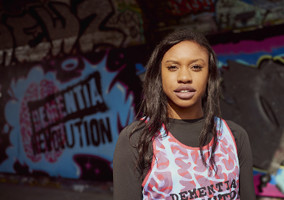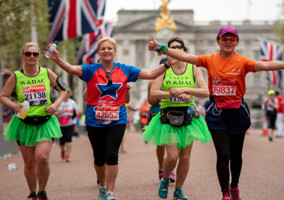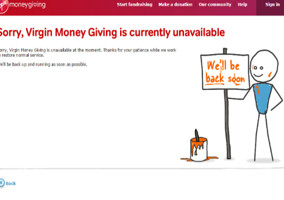Charities are unhappy after being asked for up to £22,000 to guarantee places for runners in next year’s London Marathon.
The London Marathon is the biggest single fundraising event of the year, and this year’s event has so far raised over £40m for charities.
But the waiting list to join a scheme set up in the 1990s giving charities access to places for £300 has been closed for some time.
The Golden Bond scheme was launched in 1993. 750 charities hold 15,000 places between them. Later a Silver Bond scheme was launched, and will offer 550 charities one place every five years.
In 2015 the London Marathon launched a ballot for charities that do not hold Golden Bond places or do not hold a Silver Bond place for that year. Each year, 500 places are available via this scheme.
According to London Marathon the average sum raised by a Golden Bond runner in 2017 was more than £2,700.
Advertising packages
Charities which lose out in the ballot can buy advertising packages through London Marathon’s online partner, RealBuzz, which includes advertising slots, email marketing and guaranteed places to the marathon.
Documents seen by Civil Society News show that there are nearly 20 different packages on offer, starting at around £2,500 for a package that includes one guaranteed place, and going up to £22,250 for a Gold Package, which includes eight guaranteed places.
London Marathon declined to say how many places are available via advertising packages.
Small charities ‘feel shut off’
These packages are beyond the reach of many smaller charities, and at least one large charity has said it will walk away from the event this year.
Small charities are understood to be unhappy about the lack of a level playing field, and one urged London Marathon to rethink its model.
Emily Swords, chief executive of The Theodora Children's Charity and member of the Small Charities Coalition, said: "Marathon places are essentially shut off to small charities as the waiting list is closed for the foreseeable future. We're lucky enough to get one place every five years but it's almost impossible for us to increase this. We know runners would love to run for a small charity like us."
“Big charities do fantastic work but asking us to fight against these huge organisation for funding, guarantees small charities are being set up to lose out. 97 per cent of the sector in the UK has £1m turnover or less. For the benefit of all small charities, I would ask London Marathon to overhaul their processes, be more transparent and make room for smaller organisations."
London Marathon response
London Marathon has defended its model and said that it is committed to working with charities of all sizes and that its other mass participation events have lower entry prices.
In a statement provided to Civil Society, Nick Bitel, chief executive of the London Marathon said that the event is “hugely popular”.
“We work directly with more than 1,800 charities, but hundreds more benefit through runners choosing their own fundraising cause,” he said.
He said the launch of the ballot in 2015 means gives “newer charities access to working directly with us”.
Bitel said that the Golden and Silver Bond scheme was now standard practice across other events and it “drives demand” to encourage fundraising.
“In the early years, the scheme was slow to be taken up and it was based on a first come, first served basis. The model drives demand for places so high that people gladly raise money for charity in order to participate. The guaranteed places model has huge support from charities as it has proved to be such a successful fundraising method.”
He added that charities also get support with fundraising through the partnership with Virgin Money Giving.
Bitel also defended the advertising packages, and said: “No charity is required to purchase advertising packages; it is the decision of each individual charity. Advertising on the official website has proved a very effective method of recruiting runners to fundraise. There is, therefore, huge demand for these advertising packages from charities of all sizes.”
Responding directly to concerns of small charities raised by Swords, he said: “This charity is misinformed. The size of the charity is irrelevant. Any size charity that doesn’t have Golden Bond places, or a Silver Bond place in that year, can apply for a charity ballot place. If they get a place one year, they can’t apply the next year. In reality, with the number of charities that currently apply to the charity ballot, it means at present that a charity is very likely to gain a place every other year.”
He also said that many small charities hold Golden and Silver Bonds and said he expected to open up the waiting list for the Silver Bond scheme in the next two to three years.
“The earliest adopters of Golden Bonds included a preponderance of smaller charities and the scheme has become a vital lifeline for them,” he said.
“We keep the Bond schemes under constant review and amend the charity list, including the waiting lists, as required and we expect to open up the Silver Bond scheme in the next two to three years.”
Bitel also said that London Marathon Events Ltd works with charities on five other events.
“These events include The Big Half, which has the lowest entry price for charities of any city centre half marathon on closed roads at just £39. In the first year of this event, the average raised by charities per place on Virgin Money Giving was £600, including Gift Aid. Prudential RideLondon is the largest charity fundraising cycling event in Europe and has raised more than £53 million for charity in its first five years,” he said.
Related articles












